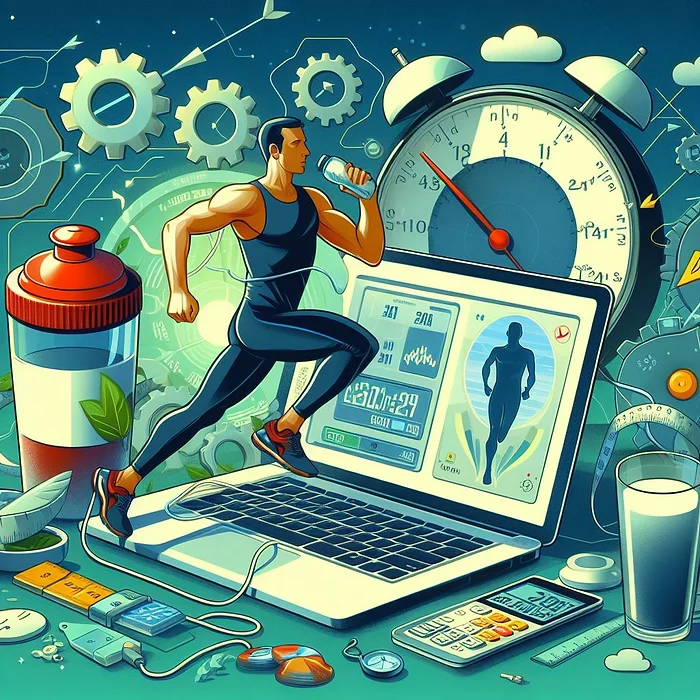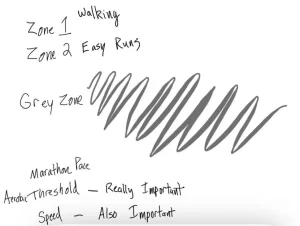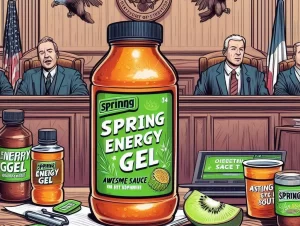Marathon and ultra-marathon runners are increasingly recognizing the vital role of fueling in their performance. Runners are constantly pushing the boundaries with nutrition and long-distance running, primarily with higher amounts of carbohydrate intake. While training receives significant attention, the importance of nutrition often goes unnoticed until race day draws near.
Runners are often under-fueled. Almost every time I start working with an athlete on the fueling for longer runs and races, we both conclude that they have been making at least one of the following common mistakes.
- Under Carbed: Not taking in enough carbohydrates to give themselves the best chance and performing to their fitness level.
- Lack of a plan: Approaching a marathon or ultra-marathon without a clear strategy for fuel intake can lead to unpredictable outcomes. The plan doesn’t need to be rigid, but we need at least the outline.
- Rigid adherence to a plan: While having a plan is crucial, flexibility is critical. Adjustments based on conditions like weather or personal discomfort are often necessary. We need to have a plan, and then we need to have strategies if and when our plan stops working.
- Using new products on race day without prior testing: Impulsively trying untested nutrition items on race day can lead to unwanted complications.
If you are undercarbed for a marathon or ultra-marathon, you’re severely limiting your performance. If you haven’t been tracking how many carbs, calories, and sodium you’re getting per hour on all runs and races 2 hours or more, you need to start NOW!
Newer runners might not realize that our bodies generally only hold enough quick, usable energy to run 60-90 minutes or less. After that, running can get very difficult, and our bodies might start trying to break down fat into usable energy. If we run out of the quick, usable energy stores of glycogen and carbohydrates, it usually feels very uncomfortable, and it really impacts our performance, A LOT. Using fat to fuel exercise severely limits our capabilities when racing. So, if we can start replenishing those glycogen and carbohydrate stores before they’re empty, we could potentially run for longer and faster.
For races that take 2 hours or less, we could experience optimal performance with 20-40g of carbs an hour.
For Races 2-4 hours, we want to shoot for 40-80g of carbs, and for anything over four hours, we should be aiming for 50g of carbs an hour at a MINIMUM, but closer to 90g of carbs per hour is better.
It’s important to keep track of all the fuel you’re able to take in and calculate totals to go over after the run. Fueling is very individualized, so hopefully, over time, you can get a better picture of what gives your body the best chance at peak performance. We can’t get an accurate picture of what happened if we aren’t objectively tracking and logging. We’re just guessing at that point. Usually, when talking to someone after a long run or race, if they didn’t keep a log, there’s usually a big disconnect between what they felt they got in and what they actually consumed.
Why Nutrition Matters in Long Races

Understanding why nutrition is vital during a long race is fundamental. It boils down to a few key things. First, our bodies can usually only hold enough carbs and calories to run for about 70-90 minutes. After that, our performance suffers regardless of the pace.So, race nutrition matters for performance. Once runners go from being undercarbed in long runs and races to filling up their carbohydrate store, they often notice another benefit; enhanced recovery. When we’re on top of our fuelling, we can dampen the severity of our fatigue from a longer running endeavor. What often happens in long runs and races is that we underfuel, and after the event, our body goes into survival mode. Instead of taking fuel and beginning the recovery process by sending blood and nutrients to our muscles, our body will slow all of our processes down to make sure we survive. When we properly fuel during and right after the race, we put our body in a position of strength to help us recover. This also can help us avoid the crashes and common overeating swings that can occur after long events like this.
Key Nutritional Factors for Marathon and Ultra Marathon Success
Successful marathon performance relies on several nutritional factors:
- Adequate fuel stores: Sufficient carbohydrate reserves.
- Optimal hydration: Maintaining proper fluid levels without overhydration is especially crucial in warm conditions.
- Proper electrolyte levels: We lose a lot of minerals from our sweat. Some people lose certain minerals faster than others. If we aren’t replenishing those minerals in accordance with our body’s needs
- Minimizing GI problems: Careful attention to pre-race meals and intake during the marathon.
Carbohydrates as Primary Fuel
Carbohydrates and fats serve as the body’s primary fuels. While fat sustains low to moderate-intensity exercise, carbohydrates are essential for higher-intensity efforts due to their faster energy delivery. Carbohydrate stores, though smaller compared to fats, are crucial for sustained intense exercise, preventing the dreaded ‘wall’ typically encountered around 20 miles into a marathon.
Sweating, Temperature Regulation, and Hydration
Sweating regulates body temperature during exercise. Adequate hydration balances fluid losses, ensuring optimal body function and reducing the risk of complications such as increased heart rate or GI problems. We lose a lot of minerals in our sweat, and we absorb more hydration by adding those minerals into our liquids. Even if it’s in small amounts, add electrolytes to your liquids to help with absorption and to avoid flushing out the electrolytes in your system.
Sodium
Sodium needs are also very subjective to the individual. Some folks know they’re salty sweaters, so we’ll start them shooting for higher mg of sodium per hour. In marathons and ultras, sodium needs can be anywhere from 300mg to 1200mg an hour. Higher amounts of sodium aren’t always better. Your body wants the correct amount. When we’re running hard for hours and hours, that number is obviously higher, but runners need to be cautious of taking too much. Sodium doesn’t prevent cramping, and while it’s critical for salty sweaters, tons of sodium is found in almost every race gel or bar. We’re not looking for the highest amount. We’re looking for the right amount for you and the conditions you’ll be running in.
Pre-Marathon Nutrition Strategies
Carbo-loading: Carb-loading is WAY too overhyped, in my opinion. At least it was; I think it’s starting to die down.
The added stress of trying to go through some protocol to cram in extra carbohydrates doesn’t seem worth it, in my opinion. The weeks before a race already bring on a lot of anxiety and nerves.
With that said, we still want our carbohydrate and glycogen stores FULL. We just don’t need to do any strange diets or protocols leading into the race. What we do need to do is, slowly, as we approach the race, put a small emphasis on eating more carb-heavy foods and less fiber. This is mostly crucial the day before and the morning of the event. If you eat too little for dinner and skip breakfast before your marathon or ultra, it’s going to limit your ability to perform; don’t do that!! Carbohydrate-rich foods: pasta, rice, potatoes, pancakes, oatmeal, Clif bars etc. Fiber-rich foods to avoid excess the night before and morning of Legumes, beans, chilis, large amounts of vegetables, and fruits.
Take some time to think of your favorite meals that you have run well after eating. Do you have a favorite pasta dish that has never caused you any issues when it comes to running or racing? Great, eat that the night before or two nights before the race. Practice these meals before race day arrives.
Products
There are a lot of great products out there, and honestly, you need to experiment a little bit. It’s one of my favorite things to do; trying new flavors and products. All of my athletes and the athletes through Sundog Running get a sick discount at The Feed dot com. They’re awesome. They have tons of great info on all the latest fueling products, and they’ll let you buy singles of products like gels to see if you like them without being stuck with a giant box of something.
Lots of folks start with Gu gels. They’re everywhere and popular. Lately, I’ve been seeing more and more people move on to other products, including myself. I’ve been using these gels from a company called NeverSecond. It’s a hydrogel, so it’s WAY easier to get down than a GU, and the flavors are amazing. Higher carb content as well. Spring Energy makes very natural gels that also pack a big punch on the carb front. And there are really impressive companies on the performance front, such as Precision Hydration and Maurten.
Similar to the liquids front, there are extensive ranges in products from how natural they are to how much carbohydrate they can pack into one of those plastic scoops. I’ve always been a Skratch guy, but there are tons of excellent companies out there. Mixes for liquids are varied solutions to solving race day fuel/nutrition problems. Because there’s such a variety in electrolyte, carb, and calorie content, it’s easy to find one to fit your needs. You can always play around with the strength or dilution of a mix as well, example; if you’re super nervous about getting enough calories or electrolytes on a particular run but you really like your nutrition setup and timing, you could try adding an extra scoop or half a scoop to your bottles to make the mix more packed with what you need.



